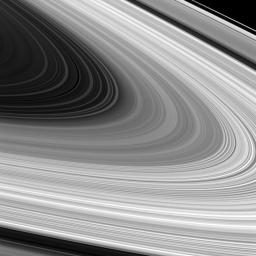
|
Glorious B
- Click the image above for a larger view
- Full-Res JPEG (1016 x 1016) (124.4 kB)
- Full-Res TIFF (1016 x 1016) (1.0 MB)
Caption:
Saturn's B ring is spread out in all its glory in this image from Cassini. Scientists are trying to better understand the origin and nature of the various structures seen in the B ring.
Saturn's B ring is the densest and most massive of all the rings. The C ring is also visible inside the B ring and the A ring puts on an appearance beyond the Cassini Division near the top and bottom of the image.
This view looks toward the sunlit side of the rings from about 7 degrees above the ringplane. The image was taken in visible light with the Cassini spacecraft wide-angle camera on July 22, 2012.
The view was obtained at a distance of approximately 201,000 miles (324,000 kilometers) from Saturn and at a Sun-Saturn-spacecraft, or phase, angle of 134 degrees. Image scale is 10 miles (16 kilometers) per pixel.
Background Info:
The Cassini-Huygens mission is a cooperative project of NASA, the European Space Agency and the Italian Space Agency. The Jet Propulsion Laboratory, a division of the California Institute of Technology in Pasadena, manages the mission for NASA's Science Mission Directorate, Washington, D.C. The Cassini orbiter and its two onboard cameras were designed, developed and assembled at JPL. The imaging operations center is based at the Space Science Institute in Boulder, Colo.
For more information about the Cassini-Huygens mission visit http://saturn.jpl.nasa.gov . The Cassini imaging team homepage is at http://ciclops.org .
Cataloging Keywords:
| Name | Value | Additional Values |
|---|---|---|
| Target | Saturn Rings | B Ring, Cassini Division, Saturn |
| System | Saturn | |
| Target Type | Ring | Gap, Planet |
| Mission | Cassini-Huygens | |
| Instrument Host | Cassini Orbiter | |
| Host Type | Orbiter | |
| Instrument | Imaging Science Subsystem (ISS) | |
| Detector | Wide Angle Camera | |
| Extra Keywords | Grayscale, Visual | |
| Acquisition Date | ||
| Release Date | 2012-12-10 | |
| Date in Caption | 2012-07-22 | |
| Image Credit | NASA/JPL-Caltech/Space Science Institute | |
| Source | photojournal.jpl.nasa.gov/catalog/PIA14638 | |
| Identifier | PIA14638 | |
